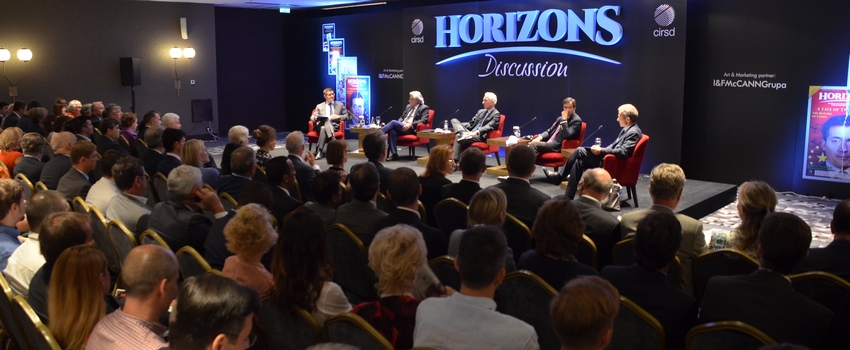European Russophobia and Europe’s Rejection of Peace: A Two-Century Failure
Europe has repeatedly rejected peace with Russia at moments when a negotiated settlement was available, and those rejections have proven profoundly self-defeating. Read more
The Center for International Relations and Sustainable Development (CIRSD) hosted the fourth Horizons Discussion in Belgrade, this time focusing on The Future of Europe.

The panel explored a variety of topics, including internal and external challenges to the EU, and prospects for EU enlargement in the Western Balkans. Moderated by CIRSD President Vuk Jeremić, the discussion featured prominent panelists such as former Foreign and Defense Minister of Portugal Luis Amado, dean of the Global Affairs Institute at the London School of Economics (LSE) Erik Berglof, Associate at Carnegie Europe Stefan Lehne, and Director of Chatham House Robin Niblett.
Mr. Lehne said that the future of the Western Balkans lies within the EU, despite the tendencies of some individuals to describe this prospect as “building floors on top of a burning house.”
Speaking on the migrant crisis, Lehne said that a joint EU strategy should seek to harmonize migration policies, produce more effective migration control, and come up with a proactive strategy directed towards the countries from which the migrants are coming. “It makes no sense to stop the Syrians who wish to go to Germany by redirecting trains to Estonia. There will be no viable solution without a common European approach and active participation of the European Commission,” Lehne said. As for the Ukraine crisis, he views the situation as being in the process of becoming a frozen conflict, stating that reaching a political solution remains uncertain and largely dependent on Russia’s next moves.
Dr. Niblett said that the EU will need to become more flexible, shaping itself in a way that will clearly define the countries at its core and the ones orbiting around it. He believes that the UK will remain an EU member, and that it is still too early to determine whether the EU will come out victorious from the ongoing economic battle.
Professor Berglof noted that the economic discrepancies between Eurozone countries became apparent in the past few years, despite the fact that the monetary union was supposed to enhance their similarities and alignment. He said that the next five years will be difficult for the European economy, although not as difficult as some would think. The prospect of EU membership will in all likelihood remain attractive to the Western Balkans, a region that wouldn’t have undergone such reforms in the past years without the enlargement process, Berglof concluded.
Mr. Amado said that Europe is going through an emergency situation, that it has to learn from its mistakes and act by conducting rational policies. “You can’t simply close the doors […] it is impossible because of the humanitarian aspects. Angela Merkel has recognized the dimension of the tragedy pretty well. This requires a strong political response. The EU needs a broad integrative approach in the short term in order to coordinate as large as possible number of its member states,” Amado said. He also stated that the EU needs a new neighbor policy towards the Middle East.
The debate was attended by several hundred people, featuring a vast number of diplomats, policymakers, intellectuals, and businessmen. Amongst others, the event was attended by U.S. ambassador to Serbia Michael Kirby, Russian ambassador Aleksandr Chepurin, French ambassador Christine Moro, as well as former Serbian Prime Minister Mirko Cvetković, Director of the Serbian Government’s Office for Kosovo and Metohija Marko Đurić, former cabinet ministers Slobodan Samardžić and Mlađan Dinkić, and the President of Belgrade Fund for Political Excellence Sonja Liht.
After this successful Belgrade event, CIRSD will organize two additional debates in Beijing and Paris to further promote the latest issue of its quarterly English-language magazine Horizons.
Photo Gallery is available here